Pausing for Reflection on Holy Vesak Day
As 21st century Malaysia hurtles deeper into the recesses of globalisation, an urban rat-race and the 'kiasu' syndrome, does Buddhist culture still bear relevance in preserving traditional values?
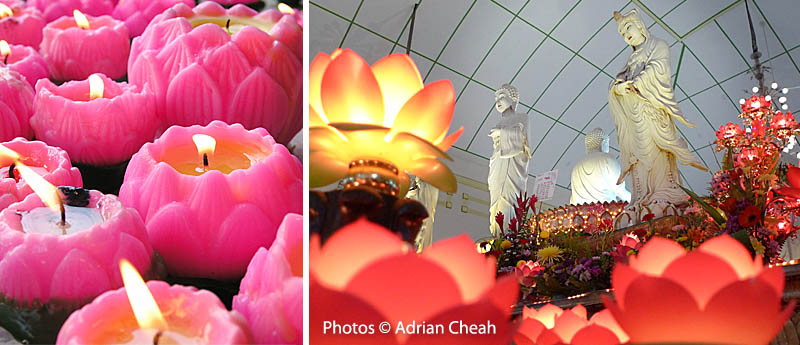
The beggar readily sees a bare floor as a place for a good sleep. The rich man, on the other hand, will have nothing else but the softest bed in a 5-star hotel.
Both men, poor and rich, have one similar need - to sleep. But they have completely different levels of craving, different heights of desire.
"Human desire," sums up Venerable Chuan Chao, "never ends."
"Many people think that a life of luxury where they earn more and more would mean they live better."
"But the material world is never-ending. It cannot give us what we want even when we think we have gained it."
Chuan Chao, a youthful Buddhist monk based in Penang, is standing along the vanguard of a mission to make his 21st-century Buddhist brethren in Malaysia confront an age of change quite certainly unprecedented in history.
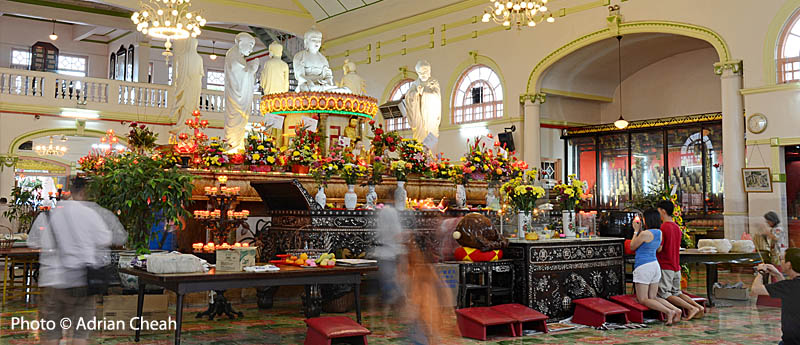
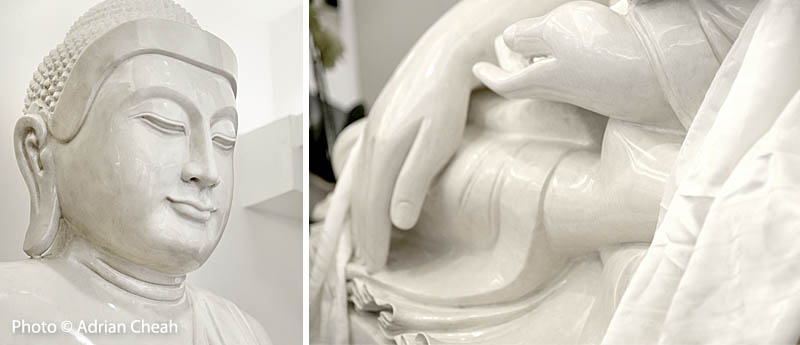
"Many parents are not practicing Buddhists; they only come to pray on a special day like Vesak," he says. "So we take the opportunity to talk to them while they come."
Like scores of monks, he will be preaching during the holy day today, ensuring the throngs hear the message the good Buddha began to spread some 2,500 years ago.
Vesak Day is called a "tri-sacred day" as it simultaneously commemorates Buddha's birth in 623 BC, his attainment of enlightenment in 588 BC at age of only 35, and his passing away to a state of Nibbana in 543 BC at age 80.
"The day is a reminder of what the Buddha has taught us," says the monk.
Globalisation and modernisation may be celebrated terms for many Malaysians now.
But Chuan Chao is convinced that a society obsessed with instant sensory gratification in a brazen, unrestrained market economy needs to stop and hear the wisdom of the enlightened Buddha now as during any other period in history.

"The world is becoming more materialistic," he says.
"Many people think that stimulation from television, from drugs, from all sorts of sensuous enjoyment can give them pleasure."
"But having this pleasure does not mean you are really contented."
Parents take the brunt of his discourse. "Most parents neglect the important aspect of raising children," he says.
"They think the material world can fulfill their children's desires. They give lots of money, video games, fancy handsets. But these only fulfill a part of the desires."
"Humans beings," he adds, "are very fragile."

But by imbibing religion and values at a young age, we can direct people, help build strong minds to face this new world.
Many thinkers have questioned whether social ills faced today are due, in part, to sections of the populace being ill-prepared to deal with the tides of materialism.
But there is pragmatism in the Buddhist approach towards viewing the individual in the physical world; the material world does have a role in meeting human necessities.
And it is precise because of this that Buddhism calls for moderation and simplicity.
Venerable Indaratana Maha Thera, the chief monk of the Mahindarama Buddhist Temple, views the Buddha as a role model for modern Malaysian youth.
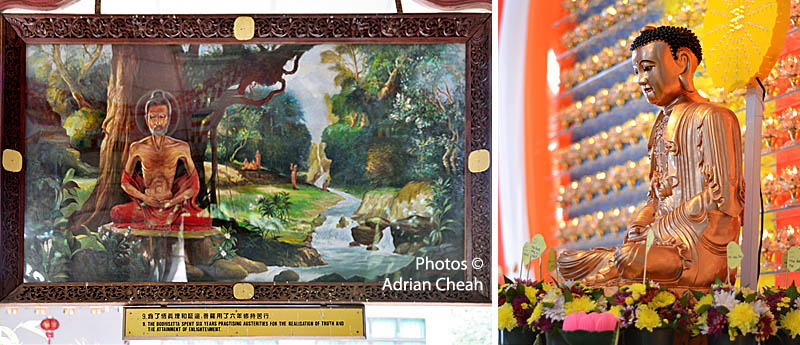
"Buddha was a prince, the son of a most powerful king, enjoying the highest luxuries one can imagine. Yet he gave all these up because he wanted to be enlightened!"
Buddhist youths can strive to emulate his renunciation some 2,500 years ago, he adds.
But their renunciation does not have to be in the form of discarding families or jobs. It can be achieved through service and charity - practical acts that generate selflessness.
"If one starts giving, he becomes prepared to sacrifice what he has," explains Indaratana, 51, who was ordained in Sri Lanka at the age of 12.
"The practice of charity, of giving, helps reduce and even eradicate our greed."
Indaratana oversees a free clinic, a home for the elderly and programmes for cancer care and organ donation where scores of youths have involved themselves.
Values take centre stage in the thrust behind his projects. He places unreserved emphasis on filial piety.
"The parent is the first teacher of the child. Caring for parents is the highest calling of the offspring.
"Children must at all times not only respect but also take care of their parents."
Such a message is obviously universal, cutting across all creeds and societies that are threatened by the diffusion of tradition in the face of influences from modern popular cultures.
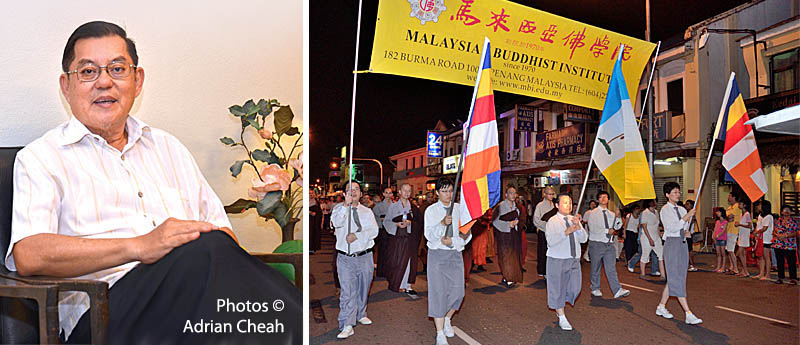
But Dato' Tan Gin Soon, vice-president of the Malaysian Young Buddhist Foundation, has observed enough to feel there is no excessive cause for alarm towards cultural displacement among Malaysian youths.
"The fear is there," he agrees. "But so far in Malaysia, we are still firm in our faiths. Perhaps our cultural upbringing is strong," he says.
Devotee Jacqlyn Khoo, 36, is perhaps a fine example of the importance of such an upbringing.
Her Buddhist parents brought her to the temple since she was a child. Ten years ago, the effect of their nurturing set in and she threw herself into social service.
"It was really wonderful," she remembers. "It gave a kind of joy money cannot buy."
Her friend, Surya Dharamdass, 43, an avid educator, stresses the power of charity in encouraging selflessness in a hectic modern world.
"Many Malaysians are getting 'kiasu' (stingy). They like to compare themselves with other people, to be better than others," she says.
"But by throwing yourself into charity, you convert such egoism into a sense of sharing, into teamwork and cooperation."
Surya has felt the beauty of giving in little deeds and not just in events of large dramatic magnitude.
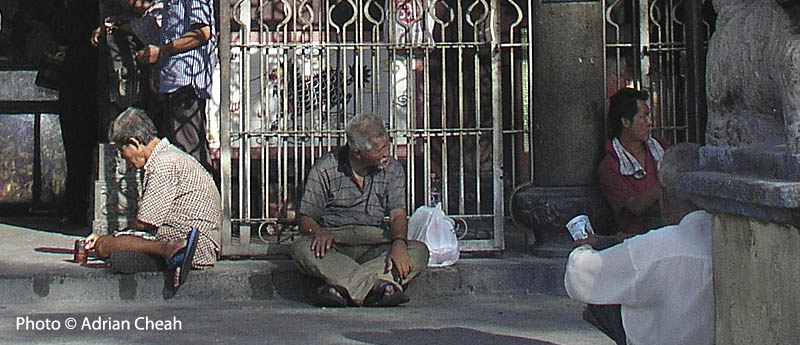
She frequently drives around with her colleagues, giving away food that has been leftover from functions to vagrants on the streets.
The expressions of heartfelt gratitude from the hungry mouths have moved her.
As principal of a Buddhist Sunday school with some 600 students, Surya helps build lessons that are more value-based than ritual-oriented. Practicality is today the essence of faith.
In fact, many modern Buddhist schools for children are now focussing more on values than customs and rituals.
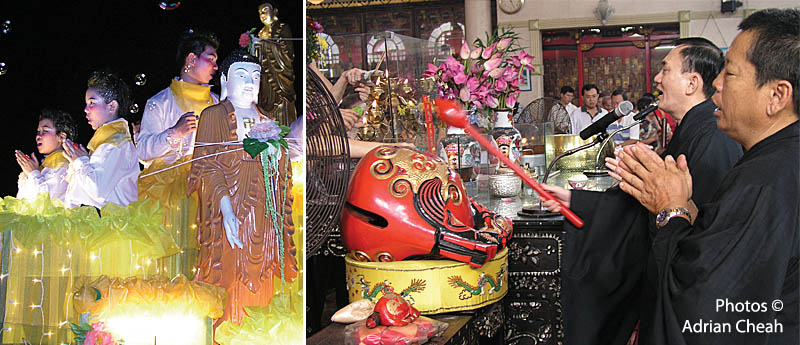
Surya yearns to instill strength and awareness in her young pupils who face an uncertain environment in the future raging with unbridled materialism. She wants to arm them with the wisdom the Buddha had passed down centuries ago for humanity's great battle.
Materialism, says a proverb, is like a sharp knife. In a mother's hand, it can prepare delicious food, but in a murderer's it serves a very different purpose.
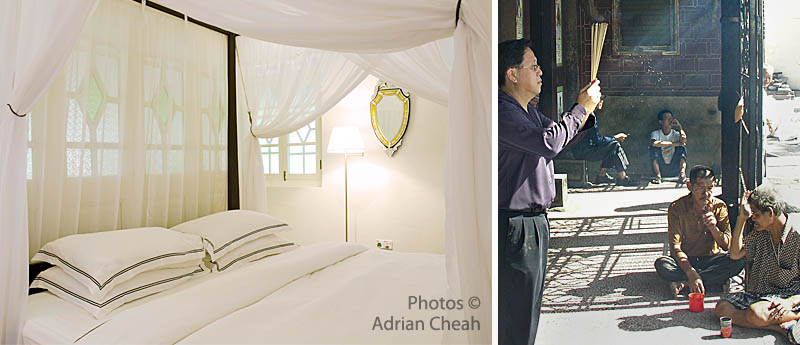
"When you reach a stage that you feel no different sleeping on a luxurious bed or on a barren floor," says the venerable Chuan Chao, "when you reach this type of outlook on life, this way of living, you can surely overcome a lot of difficulties and handicaps."
---------------------------------------------------------
First published in New Sunday Times on 22 May 2005, in conjunction with Vesak Day.
Story by Himanshu Bhatt © All rights reserved
---------------------------------------------------------
Photographs by Adrian Cheah © All rights reserved
Updated 4 May 2020